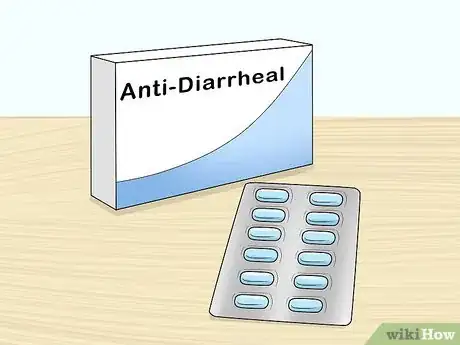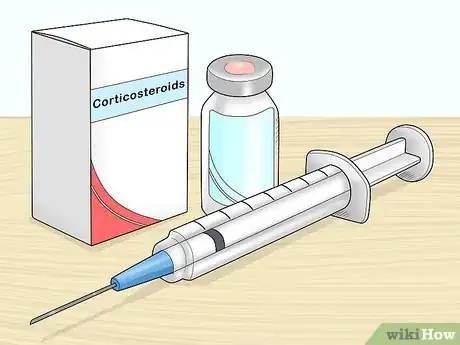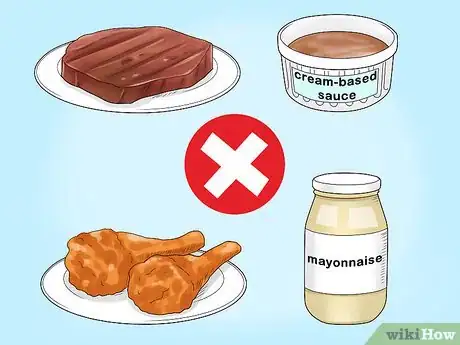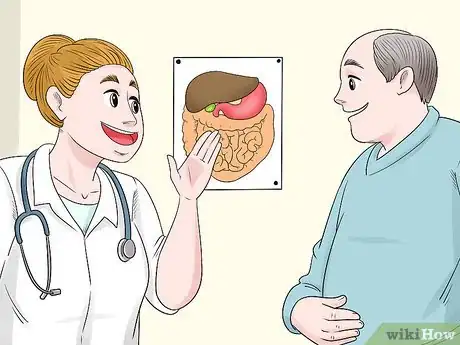This article was co-authored by Peter Gardner, MD. Peter W. Gardner, MD is a board certified physician who has practiced Gastroenterology and Hepatology for over 30 years. He specializes in diseases of the digestive system and liver. Dr. Gardner earned his Bachelor’s degree from the University of North Carolina and attended Georgetown Medical School. He completed his residency in Internal Medicine and then his fellowship in Gastroenterology at the University of Connecticut. He is a previous Chief of Gastroenterology at Stamford Hospital and remains on the staff. He is also on the staff of Greenwich Hospital and New York (Columbia) Presbyterian Hospital. Dr. Gardner is an Approved Consultant in Internal Medicine and Gastroenterology with the American Board of Internal Medicine.
wikiHow marks an article as reader-approved once it receives enough positive feedback. In this case, 100% of readers who voted found the article helpful, earning it our reader-approved status.
This article has been viewed 16,340 times.
Ulcerative colitis flare-ups can be difficult, but there are many options for dealing with them. Discuss your condition with your doctor to consider different treatment options, such as medications and dietary changes. Keep track of your flare-up triggers so that you can avoid them as much as possible. You can minimize or prevent ulcerative colitis symptoms by consulting regularly with your doctor, or with a dietician or nutritionist.
Steps
Treating Flare Ups
-
1Discuss your symptoms with your doctor. The symptoms of an ulcerative colitis flare-up can range from mild to severe, and in some cases may indicate damage to your large intestine.[1] Your doctor can assess the intensity of your symptoms to decide on the proper treatment. See your doctor if you experience:[2]
- Loose, bloody stools
- Abdominal pain, cramping, or tenderness
- Fever
- Nausea
- Rapid heart rate
- Anemia
- Fatigue
-
2Ask your doctor about treating ulcerative colitis with 5-aminosalicylic acid. The most common medication prescribed for ulcerative colitis is 5-aminosalicylic acid, in the form of Mesalamine, Cansa, Apriso, or Lialda. Ask your doctor if this medication would be right for treating your colitis. If you are already taking this medication and experiencing frequent flare-ups, ask about changing your dosage.[3]
- This medication may be prescribed in the form of pills or suppositories.
Advertisement -
3Take an over-the-counter medication to control diarrhea. Diarrhea is a common part of ulcerative colitis flare-ups. Ask your doctor about taking a non-prescription, anti-diarrheal medication to ease this symptom. In some cases, your doctor may advise against taking these medications due to the increased risk of developing an enlarged colon.[4]
- Do not exceed the recommended dosage for these medications.
-
4Inquire about corticosteroids for temporary treatment of your flare-ups. Doctors will sometimes prescribe corticosteroids for moderate to severe symptoms of ulcerative colitis. These drugs should not be taken for more than a few weeks, as they may become addictive or lose effectiveness after prolonged use. Ask your doctor about corticosteroids to reduce inflammation and ease your flare-ups.[5]
- Corticosteroids can be administered orally, as an injection, rectally, or intravenously.
-
5Consider immunosuppressants if other treatments don't ease your symptoms. In severe cases, doctors may prescribe immunosuppressant medications to treat ulcerative colitis flare-ups. Immunosuppressants help to suppress the body's immune response and reduce inflammation. Ask your doctor if this course of treatment is right for you.[6]
- Immunosuppressants may leave you at a higher risk of infection.
- Immunosuppressant drugs often prescribed for the treatment of ulcerative colitis include azathioprine, cyclosporine, infliximab, and vedolizumab.
Avoiding Triggers
-
1Steer clear of high fat foods. Fatty foods can be difficult for the body to process and may cause digestive distress if you have ulcerative colitis. In general, any greasy, creamy, or rich foods should be avoided to reduce the risk of flare-ups. These foods may include:
- Fatty meats, such as bacon or steak
- Cream-based sauces
- High-fat condiments like mayonnaise
- Fried foods
-
2Avoid consuming dairy products. Dairy foods are a common cause of digestive distress and should be avoided to prevent the risk of ulcerative colitis flare-ups. If you are already experiencing flare-ups, eliminating dairy may curb symptoms such as diarrhea, abdominal pain and gas. Steer clear of food and drinks like milk, cream, ice cream, cheese, and yogurt.[7]
- Try substituting cow's milk for almond or soy milk in coffee, smoothies, and recipes.
-
3Reduce your intake of high-fiber foods if they trigger flare-ups. High-fibers food are very healthy, but they can also be difficult to digest. If whole grains and fresh produce cause you digestive distress, reduce or eliminate your consumption of them and see if your symptoms improve. Nuts, seeds, corn, and popcorn should also be avoided if you have difficulty digesting fiber-rich foods.[8]
- Instead of eliminating your consumption of fresh produce entirely, try steaming, baking, roasting, or grilling your vegetables.
-
4Avoid alcohol and caffeine, which can worsen flare-up symptoms. Alcohol and caffeine can stimulate the bowels, making diarrhea worse. Steer clear of beverages containing either of these while you deal with an ulcerative colitis flare-up. This includes wine, beer, mixed alcoholic drinks, coffee, and caffeinated teas and sodas.[9]
- Opt to drink water, herbal teas, or juices instead.
- You should also avoid carbonated beverages, which can cause intestinal gas.
Preventing Future Flare-Ups
-
1Go for regular check-ups with your doctor. The best way to keep your ulcerative colitis in check is to see your doctor regularly to track your condition. Keep tracks of your symptoms before your visits so you can accurately describe them during your appointments. Discuss different treatment options and lifestyle changes with your doctor to work towards wellness goals.[10]
- To get the most accurate information for your doctor, keep a log of all the food you eat throughout the day. Note what symptoms appear after what meals in this log, too. Bring this to your doctor so that you can discuss this information with them.
- For further, more specialized assistance, ask your doctor to refer you to a gastroenterologist.
-
2Consult a dietitian or nutritionist. A dietician or nutritionist can help you adjust your diet around your ulcerative flare-ups without compromising your health. They may also help you put together a meal plan to help minimize your symptoms. Ask your doctor if they can refer you to such a specialist, or look online for licensed specialists in your area. [11]
-
3Keep a food diary. Keeping track of what you eat and when you experience flare-ups is a good way to track what foods trigger your ulcerative colitis symptoms. Record your meals, snacks, and beverages in a written journal, or on a computer document like an excel spreadsheet. Be sure to note any condiments, sauces, or seasonings added to your meals.[12]
- Discuss your observations with a doctor before eliminating any foods from your diet, which may result in vitamin or mineral deficiencies.
-
4Eat smaller meals during the day. If you suffer from ulcerative colitis, having 3 large meals a day may cause stress on your digestive system. Opt to eat 5-6 smaller meals each day instead. Examples of small meals could include:[13]
- A small turkey or chicken wrap
- A small portion of pasta
- A small portion of fish with a side of cooked vegetables
- A small bowl of cereal
Expert Q&A
-
QuestionHow do you treat a colitis flare-up?
 Peter Gardner, MDPeter W. Gardner, MD is a board certified physician who has practiced Gastroenterology and Hepatology for over 30 years. He specializes in diseases of the digestive system and liver. Dr. Gardner earned his Bachelor’s degree from the University of North Carolina and attended Georgetown Medical School. He completed his residency in Internal Medicine and then his fellowship in Gastroenterology at the University of Connecticut. He is a previous Chief of Gastroenterology at Stamford Hospital and remains on the staff. He is also on the staff of Greenwich Hospital and New York (Columbia) Presbyterian Hospital. Dr. Gardner is an Approved Consultant in Internal Medicine and Gastroenterology with the American Board of Internal Medicine.
Peter Gardner, MDPeter W. Gardner, MD is a board certified physician who has practiced Gastroenterology and Hepatology for over 30 years. He specializes in diseases of the digestive system and liver. Dr. Gardner earned his Bachelor’s degree from the University of North Carolina and attended Georgetown Medical School. He completed his residency in Internal Medicine and then his fellowship in Gastroenterology at the University of Connecticut. He is a previous Chief of Gastroenterology at Stamford Hospital and remains on the staff. He is also on the staff of Greenwich Hospital and New York (Columbia) Presbyterian Hospital. Dr. Gardner is an Approved Consultant in Internal Medicine and Gastroenterology with the American Board of Internal Medicine.
Board Certified Gastroenterologist That all depends on how severe your symptoms are. Your doctor may prescribe a steroid medication, an enema, or give you an injectable medication.
That all depends on how severe your symptoms are. Your doctor may prescribe a steroid medication, an enema, or give you an injectable medication. -
QuestionCan I eat eggs if I have colitis?
 Chris M. Matsko, MDDr. Chris M. Matsko is a retired physician based in Pittsburgh, Pennsylvania. With over 25 years of medical research experience, Dr. Matsko was awarded the Pittsburgh Cornell University Leadership Award for Excellence. He holds a BS in Nutritional Science from Cornell University and an MD from the Temple University School of Medicine in 2007. Dr. Matsko earned a Research Writing Certification from the American Medical Writers Association (AMWA) in 2016 and a Medical Writing & Editing Certification from the University of Chicago in 2017.
Chris M. Matsko, MDDr. Chris M. Matsko is a retired physician based in Pittsburgh, Pennsylvania. With over 25 years of medical research experience, Dr. Matsko was awarded the Pittsburgh Cornell University Leadership Award for Excellence. He holds a BS in Nutritional Science from Cornell University and an MD from the Temple University School of Medicine in 2007. Dr. Matsko earned a Research Writing Certification from the American Medical Writers Association (AMWA) in 2016 and a Medical Writing & Editing Certification from the University of Chicago in 2017.
Family Medicine Physician Eggs should be fine to eat. However, stop eating them if they bother your bowels.
Eggs should be fine to eat. However, stop eating them if they bother your bowels.
Warnings
- Ulcerative colitis flare-ups can be unpredictable and may get progressively worse over time.⧼thumbs_response⧽
- Over time, ulcerative colitis may cause severe damage to the large intestine that may require surgery.⧼thumbs_response⧽
- Ulcerative colitis may cause an increased risk of colon cancer, so regular screenings are important.⧼thumbs_response⧽
- Ulcerative colitis may cause decreased levels of vitamin D, which can lead to bone loss.⧼thumbs_response⧽
References
- ↑ Peter Gardner, MD. Board Certified Gastroenterologist. Expert Interview. 25 August 2020.
- ↑ https://www.crohnscolitisfoundation.org/sites/default/files/2019-07/managing-flares-brochure-final-online.pdf
- ↑ https://www.nhs.uk/conditions/ulcerative-colitis/
- ↑ https://www.mayoclinic.org/diseases-conditions/ulcerative-colitis/diagnosis-treatment/drc-20353331
- ↑ https://www.crohnscolitisfoundation.org/sites/default/files/2019-07/managing-flares-brochure-final-online.pdf
- ↑ https://www.mayoclinic.org/diseases-conditions/ulcerative-colitis/diagnosis-treatment/drc-20353331
- ↑ https://www.mayoclinic.org/diseases-conditions/ulcerative-colitis/in-depth/ulcerative-colitis-flare-up/art-20120410
- ↑ https://www.mayoclinic.org/diseases-conditions/ulcerative-colitis/in-depth/ulcerative-colitis-flare-up/art-20120410
- ↑ https://www.mayoclinic.org/diseases-conditions/ulcerative-colitis/in-depth/ulcerative-colitis-flare-up/art-20120410
- ↑ https://www.crohnscolitisfoundation.org/sites/default/files/2019-07/managing-flares-brochure-final-online.pdf
- ↑ https://www.crohnscolitisfoundation.org/sites/default/files/2019-07/managing-flares-brochure-final-online.pdf
- ↑ https://www.nhs.uk/conditions/ulcerative-colitis/living-with/
- ↑ https://www.mayoclinic.org/diseases-conditions/ulcerative-colitis/in-depth/ulcerative-colitis-flare-up/art-20120410






























































Medical Disclaimer
The content of this article is not intended to be a substitute for professional medical advice, examination, diagnosis, or treatment. You should always contact your doctor or other qualified healthcare professional before starting, changing, or stopping any kind of health treatment.
Read More...